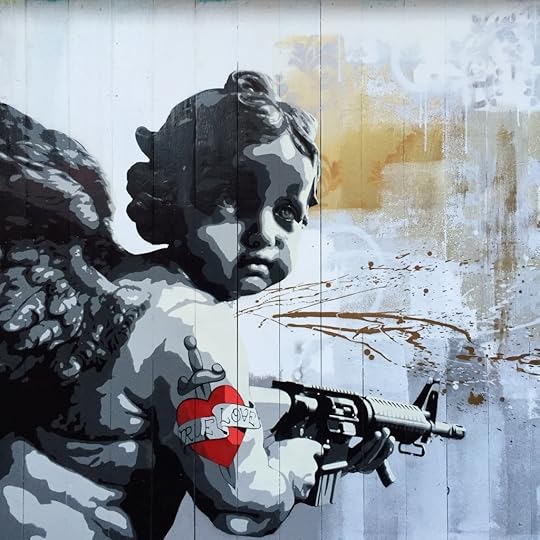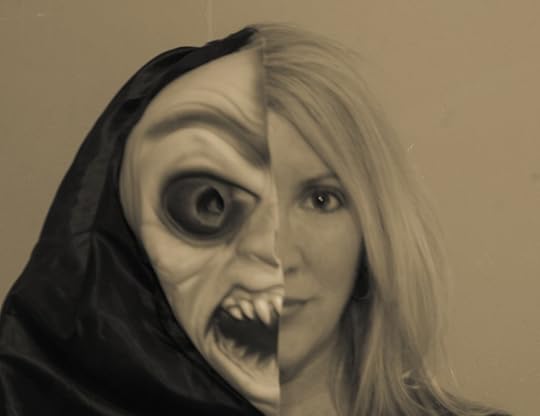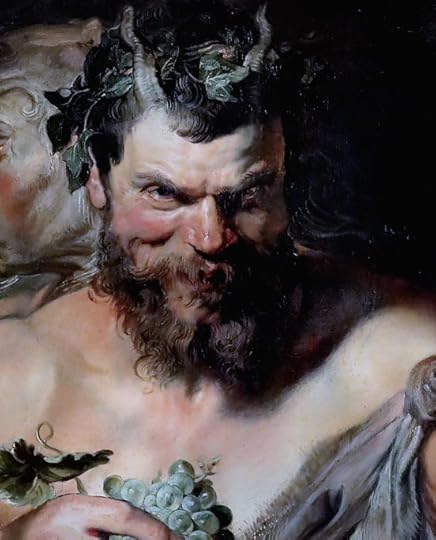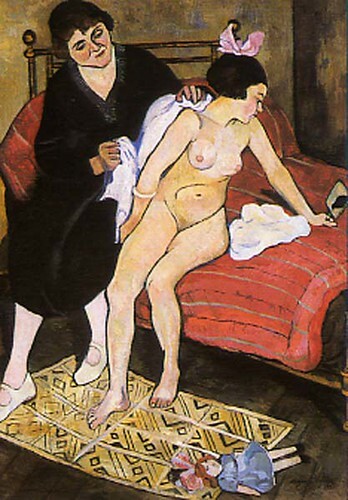Robin Helweg-Larsen's Blog, page 15
February 14, 2025
Max Gutmann, ‘Villaintine’s Day’

It’s horrible and rather stupid
To hold each year a day for Cupid
Whose claim to fame is shooting folks,
Aggression none of them provokes.
Is this behavior to condone?
We have no day for Al Capone.
No holidays are lavished on
John Dillinger or Genghis Khan.
We don’t exalt the memories
Of vicious monsters such as these.
Would we have changed our attitude
If they had been in flight and nude?
*****
Max Gutmann writes: “Since this was written, we’ve found other ways of celebrating villains.”
The poem was originally published in Light.
Max Gutmann has contributed to New Statesman, Able Muse, Cricket, and other publications. His plays have appeared throughout the U.S. (see maxgutmann.com). His book There Was a Young Girl from Verona sold several copies.
Photo: Used by permission of the creator, DS:
WWW.DSART.CO.UK
Instagram: @DS__ART
Twitter: @DS__ART
February 12, 2025
Using form: Susan Jarvis Bryant, ‘Sorceress’

She is polished and pernicious
Her demeanor is delicious
She will soften the suspicious
With her smile
She’ll abash you then disarm you
She’ll harass and she’ll alarm you
Then she’ll nonchalantly charm you
That’s her style
She’ll reject and then she’ll choose you
She’ll respect and then she’ll use you
She’ll protect and then she’ll bruise you
In a flash
She’ll dismiss you then possess you
She will curse you then she’ll bless you
She’ll distress and then impress you
With panache
She’ll accuse and then assuage you
She’ll abuse and she’ll upstage you
She’ll amuse and she’ll enrage you
Every day
She’ll assist you then she’ll spurn you
She’ll enlist you then she’ll burn you
She will twist and she will turn you
Every way
She will praise and then berate you
She will raise and then deflate you
She’ll amaze and still frustrate you
You can’t win
She’s capricious and malicious
She is smoothly surreptitious
She conceals a core that’s vicious
With a grin
*****
Susan Jarvis Bryant writes: “This is one of those poems that simply wrote itself. It’s a nonce form that appeared in my head as a song without lyrics. The lyrics came easily. I love the way words fit together to create music – a melodious flow that lifts images to a greater height. Passion always assists me in the creative process, and this poem is written about someone in particular… someone that irked me greatly… someone I will never mention. I’ll just nod and smile a satisfied smile when reading the poem. Poetry composition can be immensely cathartic.”
‘Sorceress’ was originally published in Snakeskin.
Susan Jarvis Bryant is originally from the U.K. and now lives on the coastal plains of Texas. Susan has poetry published on The Society of Classical Poets, Lighten Up Online, Snakeskin, Light, Sparks of Calliope, and Expansive Poetry Online, The Road Not Taken, and New English Review. She also has poetry published in The Lyric, Trinacria, and Beth Houston’s Extreme Formal Poems and Extreme Sonnets II anthologies. Susan is the winner of the 2020 International SCP Poetry Competition and was nominated for the 2022 and 2024 Pushcart Prize. She has published two books – Elephants Unleashed and Fern Feathered Edges.
Photo: “Day 47-Split Personality” by Bazule is licensed under CC BY-ND 2.0.
February 10, 2025
Quatrains: Fergus Cullen, ‘Wisdom of Working Men’

“One thing you must accept,”
Said the butcher—”and I don’t intend this meanly:
To live is to get divided up
And to live well is to divide up cleanly.”
“One thought that made sense of things,”
Said the baker—“perhaps even solved life’s riddle:
To live is to harden in the heat
And to live well is to stay soft in the middle.”
“One principle strikes me as ultimate,”
Said the candlestick-maker—“if not downright holy:
To live is to burn down
And to live well is to burn down slowly.”
*****
Fergus Cullen writes: “These stanzas are about that state in which work comes to occupy one’s mind so utterly that one begins to see the rest of life through it. They do not make any statement on the subject: we just hear from some personalities living in this condition.I wanted contrast. On the one hand, the form is so light as to be barely there (speech rhythms in long lines, stanzas only pulled together by trite rhymes); and the characters originate in the world of nursery rhyme. On the other, these characters take on the biggest subject; and what they say may sound rueful, even bitter. It was certainly written that way; though, returning to it after some time, I see that it need not be read that way. This is one of two versions of the poem and was published in The Borough. I hope the other, rather different, shall appear soonish.”
Fergus Cullen is a postgraduate researcher in history at Queen Mary, University of London, and an occasional writer and translator of prose and verse.
https://x.com/FairGoose
https://ferguscullen.blogspot.com/p/about.html
Photo: “Rub-a-dub-dub Three Men in a Tub” by DJOtaku is licensed under CC BY-NC-SA 2.0.
February 8, 2025
Quatrains: Susan McLean, ‘Pain Management’

The management has gauged how much you’ll take
before you buckle or walk out. They care
about your health—at least until you break,
use up your sick leave, or require repair.
The management endorses your retiring
early. They will help you out the door,
so that they can economize by hiring
fresh blood for half of what they paid before.
The management can’t monetize your gain
in knowledge or experience. They doubt
that anything you’d do if you remain
could beat their savings if you’re shunted out.
They needn’t lay you off, just raise your stress
through higher workloads and adverse conditions,
until exhaustion, strain, and hopelessness
force you to leave, fulfilling their ambitions.
*****
Susan McLean writes: “In my lifetime, I’ve worked in private businesses, government agencies, and academia; most of them abused or exploited workers at some level, which is not surprising when power relations are one-sided. However, I was most shocked by what happened when the business model was applied to education. Education suffers when students are treated as products to be turned out as cheaply as possible, and when teachers are treated as easily replaceable cogs in a machine. But the mistreatment of workers to increase profitability is widespread across many forms of employment, so I did not want to limit the poem’s relevance to the academic world.
“Over the thirty years that I taught at a state university, states reduced the amount they paid for public higher education, shifting the economic burden more and more to the students, and creating budget crises for the universities. In response, university administrators reduced their hiring of professors, often increasing class sizes dramatically, shifting teaching of many classes to ridiculously underpaid grad students or adjunct instructors with no job security, and shutting down departments in order to lay off tenured professors. Students were paying more and getting less; professors were overworked and fearful of losing their jobs at ages at which no one else would be likely to hire them; recent PhDs were unable to find teaching jobs with a livable wage or any prospect of long-term employment. Meanwhile, administrative jobs were burgeoning, adding more deans and assistant deans to bolster the status and shoulder the duties of those in charge.
“The stress and overwork that many professors experienced under the business model of higher education took a physical toll on many, with some disciplines suffering more than others. Those who had to spend endless hours at computers or grading papers tended to develop back pain and a host of other ailments common to sedentary jobs. When administrators offered incentives for them to accept early retirement, so that the university could save money by replacing them with lower-paid workers, many retired. I was one of them.
“This poem got its start when I noticed that “pain management” (usually associated with using analgesics or other methods to reduce pain) could also mean “management by means of pain.” It was published in New Verse Review.”
Susan McLean has two books of poetry, The Best Disguise and The Whetstone Misses the Knife, and one book of translations of Martial, Selected Epigrams. Her poems have appeared in Light, Lighten Up Online, Measure, Able Muse, and elsewhere. She lives in Iowa City, Iowa.
https://www.pw.org/content/susan_mclean
February 7, 2025
Petrarchan Sonnet: Jane Blanchard, ‘Microsania imperfecta’

She was the one who went off on her own.
She was the one who filed for the divorce.
You gave her what she wanted in due course.
Still she will never leave your life alone.
Available through email more than phone,
You have remained a favorite resource.
She contacts you supposedly perforce,
Less for herself than for a son long grown.
She seeks a certain something left behind,
A sterling ladle or an antique chest,
A recipe or record you must find.
Your common past has yet to enter rest
Since fire so often burns within her mind.
For smoke fly’s sake, you try to do your best.
*****
Jane Blanchard writes: “I came across the Latin term for this insect in an article in The Guardian about New York City in the summer of 2023, and the metaphor seemed curiously applicable to a particular person. A somewhat-Petrarchan sonnet then manifested itself.
New Yorkers baffled by tiny flying bugs swarming city in wake of smoke | US news | The Guardian
On the Ecology of a Smoke Fly, Microsania imperfecta12 | Annals of the Entomological Society of America | Oxford Academic
I am gIad that Clarence Caddell chose to include the poem in the second issue of The Borough.”
A native Virginian, Jane Blanchard lives and writes in Georgia. Her collections with Kelsay Books include Metes and Bounds (2023) and Furthermore (forthcoming, 2025).
Photo: “Microsania” by Guilherme A. Fischer is licensed under CC BY-NC 4.0.
February 5, 2025
Sonnet variation: Juleigh Howard-Hobson, ‘Sylvan Episode’

He looked at me as if I ought to know
just who he was
but I did not. I looked away, then so
did he. Alas
I didn’t recognize the Great God Pan
in human form.
I simply thought he was another man.
I felt a warm
gaze inviting me once more. I turned to
see him changed. A
God again, hooves and furry legs, horns grew.
He gestured “Hey?”
I was too dumbstruck to do more than stare.
He shook his curls and sprinted off somewhere.
*****
Juleigh Howard-Hobson writes: “I wrote this when I lived off-grid on ten acres up in rural Washington State.The forest that made up half my property was dark and creepy. The Great God Pan was no more out of place than BigFoot or werewolves. All of which I imagined I saw/heard from time to time (I use italics as I am not absolutely convinced it was all imagination). Nothing out there ever hurt me, so all’s well that ends well–I’ve since moved back to civilization, which is far more frightening in many ways. As for the form–well, that just was how the poem decided to be.”
Juleigh Howard-Hobson’s work can be found in Think Journal, Able Muse, New Verse Review (including this poem), The Deadlands, Autumn Sky Poetry and other venues. She has been nominated for “The Best of the Net”, Pushcart, Elgin & Rhysling Awards. Her latest book is Curses, Black Spells & Hexes (Alien Buddha). A member of the HWA and the SFPA, she lives on the coast of the Pacific Northwest. In a poetically haunted house.
X: poetforest
Photo detail “IMG_4017RBA Peter Paul Rubens 1577-1640 Anvers Deux Satyrs Two Satyrs ca 1619 Munich Alte Pinakothek” by jean louis mazieres is licensed under CC BY-NC-SA 2.0.
February 3, 2025
Couplets: Richard Meyer, ‘The Benighted States of America’

now we, the people, willingly obtuse
and largely satisfied with self-abuse
elect a narcissistic psychopath
who rules with lies, incompetence, and wrath;
accept a healthcare system that’s a mess
and limp from life to death with less and less;
continue to dismiss without a care
the shit we dump in water, land, and air;
allow the filthy rich to have their way,
to run the world, to bleed us day by day;
abandon logic, reason, vital news
and swallow whole all sorts of crackpot views —
we piss away our brains, our soul, our nerve
and get the fucked up country we deserve
*****
Richard Meyer writes: “Current cultural and political circumstances have me feeling ornery, so I hammered out this verse about the great American democratic experiment. My caustic verse was partly inspired by the comments of various prominent writers throughout history, including Thomas Jefferson who said, “The government you elect is the government you deserve”.”
Richard Meyer, a former English and humanities teacher, lives in Mankato, MN. A book of his collected poems, Orbital Paths, was a silver medalist winner in the 2016 IBPA Benjamin Franklin Awards. He was awarded the 2012 Robert Frost Farm Prize for his poem “Fieldstone” and was the recipient of the 2014 String Poet Prize for his poem “The Autumn Way.” His poetry has appeared in a variety of print and online journals and has also received top honors several times in the Great River Shakespeare Festival sonnet contest. His most recent book, Wise Heart, is a memoir of his mother Gert who was born in poverty, came of age during the Great Depression, enlisted in the army during World War II, served overseas, and was awarded the Bronze Star for meritorious service performed during the Battle of the Bulge. His books are available through Amazon.
Photo by Fort George G. Meade is licensed under CC BY 2.0.
February 1, 2025
Weekend read: Sonnet crown: Barbara Lydecker Crane, ‘Roughly True’
Suzanne Valadon, 1865-1938, Paris

What, you haven’t heard of me, despite
my art and stormy life? There’s much to tell
of pride and bitterness, of bliss and hell—
but not regret. I’ll fill my pen and write.
I was born a bastard. Maman worked,
a laundress, while I’d roam Montmartre, spying
through café and whorehouse doorways, trying
to snitch some fruit or francs. I laughed and lurked.
With lumps of coal I loved to draw on streets.
Ditching convent school at puberty,
I learned to earn my way. I felt free
in circus work, curvaceous and petite
and daring on the high trapeze, strong
until I hurt my back—I fell headlong.
That set me back, but new work came along—
also daring, deemed risqué—being painted,
a model for men. Few were sainted . . .
nor was I. I didn’t think it wrong
to give a man some pleasure and to claim
my own. For one artiste I posed unclad
and soon became his favorite lover. I had
his child, and kept my word: I didn’t name
that man on papers with a ‘Father’ line
and kept on working. Maman tended him,
my son, Maurice Utrillo—a pseudonym
so he would not be stigmatized by mine,
that of the saucy urchin shedding clothes—
and budding painter, watching men compose.
I watched the colors bloom as men composed.
Toulouse-Lautrec’s hues, both somber and bright,
would join or jar to make a mood just right.
He’d talk of wealthy clients and gallery shows
while I could study his techniques with paint.
He studied me and loved my breasts, my hair,
my thighs, my openness to him. I dared
to love that rich midget with no restraint.
When he refused to marry me, my feigned
suicide didn’t change his mind.
But what I learned while posing, I combined
with my good eye, instinctive and untrained.
I’d use my wits (and likely my libido)
to paint in oils, with honesty my credo.
I painted nude women by my credo.
When I showed Degas my work, he praised
me with, “Madame, you’re one of us!” That raised
my nerve; like those Montmartre men, I’d show
my art—although I’d wish my name need not
be printed next to ‘woman artist,’ a tag
suggesting Other like a warning flag.
I’m already Other in my lot
as Bastard-with-a-Bastard history.
Will I be known for art or just my life
of scandal? I never stayed a bougeois wife,
as two would always tangle into three;
our pacts permitting infidelity
could not prevent one partner’s jealousy.
His cryptic music vented jealousy;
Eric Satie was moody, odd, hysteric—
and amusing, in and out of bed. Eric
and Paul Mousis loved me zealously
and it was bound to chafe, our double link.
Mousis was rich; Satie holed up in one
squalid room. He slowly came undone
without me to himself—he took to drink
till drink took him. Maurice, by then eighteen,
also drank. Since he was prone to rage
and smashing things since an early age,
Maman would feed him wine to calm such scenes.
When briefly sober, it was to me he came—
I treasured hearing Maman as my name.
Of course Maurice Utrillo made his name
with me his mother-teacher and his Papa
(I tell you now) Pierre-Auguste Renoir!
Maurice was barely sane, but all the same,
prolific and successful in his art.
His painter colleague André, with brains and flair,
had tireless desire in our affair;
our turbulent trio could not live apart.
With André as our agent, income flowed—
I once took fifty children to the circus . . .
Montmartre beggars crowded round to work us . . .
we’d help out any artist friend who owed.
The stream of money later dried to drought,
but while it flowed I bloomed by giving out.
Too soon I knew my bloom was giving out—
I missed men’s wide-eyed stares, their swiveled heads.
André, still youthful, strayed to other beds;
Maurice would drink or sit around and pout.
We three unraveled into separate ways.
Instead of painting nudes I painted flowers;
they didn’t sell but brightened up the hours
of living alone, inviting in malaise,
till I found Gazi. This young, exotic man
takes care of me and listens to my stories,
roughly true—my slights, successes, glories.
I’m seventy-two. I’ll end where I began,
a bastard bitch whose art was bold and right.
My pride and grit leave little room for spite.
*****
Here is what the judge for the 2024 Kim Bridgford Memorial Sonnet Contest wrote:
Praise for the winning sonnet crown: Among a strong group of finalists, “Roughly True” distinguished itself across the board—in form, in voice, in message, in grace. After reading these seven sonnets in the voice of French painter Suzanne Valadon, I felt as if I had just taken short courses in poetic form, meter, rhyme, and art history, all expertly and candidly delivered by the fully realized persona of an accomplished, but overshadowed figure, one exquisitely resurrected here in verse.
~Dan Albergotti, Judge
Barbara Lydecker Crane writes: “I was surprised and thrilled to win this contest, and further pleased that the judge seemed to recognize the same strength of character in Suzanne Valadon that I did. The more I researched her life and work, the more I felt I actually knew this gritty woman a bit, despite our wildly different lives. As I get older I find I am more interested in writing about others than myself. My latest book, You Will Remember Me (Able Muse), is a collection of persona poems about portrait artists and their works. I am currently writing a new series of persona poems, this time about landscape artists and their works. This time, rather than writing all sonnets, each poem takes a different form; but all (so far) are in rhyme and meter. That seems fitting both for older times and for the craft and musicality I strive for, to befit the art that I hope to see with these poems one day, perhaps in a new book. And there is something about writing in form that, to me, is exactly like framing a picture. What a difference that makes; it says “completed,” and adds its own panache to the art.”
Photo: “The Abandoned Doll by Suzanne Valadon-1921” by mary holman is licensed under CC BY-NC-SA 2.0.
January 31, 2025
Short verse: RHL, ‘The Romance of the Challenge’

Suggesting,
questing,
testing;
contesting,
besting,
resting.
*****
Humans, in any culture, seem naturally attracted to quests; often to more than one at a time, and contradictory. Maybe the universe is just a playground for questing…
Published this week in The Asses of Parnassus. Thanks, Brooke Clark!
Photo: “”The victorious knight” Berry Brothers hard oil finish vanquishes the field and receives the guerdon of merit. (front)” by Boston Public Library is licensed under CC BY 2.0.
January 29, 2025
Barbara Lydecker Crane, ‘My Letter to Sonnet Insurance’
 A billboard seen in Toronto read Sonnet Insurance.
A billboard seen in Toronto read Sonnet Insurance.Dear Sonnet staff: I’m eager for your plan!
I’ll want an underwriter old-school-based,
Petrarchan or like Larkin in his taste:
he’ll speak my terms. I’ll benefit from your man
adjusting rhymes, making meter strict,
assuming the risk of an errant anapest.
Does your firm ensure I’ll stand time’s test?
Do you pull strings to have each effort picked
by a premier publication? One quick draft
in the condition of a pre-existing sonnet,
and the English-speaking world might dote upon it.
But truth be told, my first attempts aren’t craft.
Sonnet Insurance, kindly file this letter;
insure me later, when it’s written better.
*****
First published in Light.



